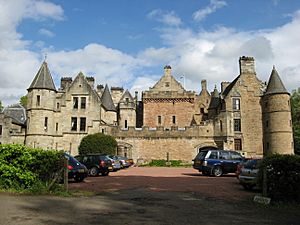Dalzell House facts for kids
Quick facts for kids Dalzell House |
|
|---|---|

Dalzell House: the tower house is in the centre, with the 17th-century south range on the right, and the 19th-century north range on the left
|
|
| Location | Motherwell, North Lanarkshire, Scotland |
| Built | c. 15th century c. 1649 1857–1859 |
| Built for | Dalzell family James Hamilton of Boggs John Hamilton, 1st Baron Hamilton of Dalzell |
| Restored | late 1980s |
| Restored by | Classical House |
| Architect | R. W. Billings |
|
Listed Building – Category A
|
|
| Designated | 28 January 1971 |
| Reference no. | LB38238 |
|
Inventory of Gardens and Designed Landscapes in Scotland
|
|
| Designated | 1 July 1987 |
| Reference no. | GDL00132 |
| Lua error in Module:Location_map at line 420: attempt to index field 'wikibase' (a nil value). | |
Dalzell House is a very old and important house in Motherwell, North Lanarkshire, Scotland. It sits by the River Clyde. The oldest part of the house is a tower house from the 1400s. Over the years, more parts were added in the 1600s and 1800s. In the 1980s, the house was carefully fixed up and turned into 18 private apartments. The large area around the house, called the Dalzell estate, is now owned by the North Lanarkshire Council. Dalzell House is a special "Category A" listed building, which means it is very important historically. Its beautiful gardens are also protected.
Contents
The History of Dalzell House
Dalzell House has a long and interesting history, starting with the Dalzell family who first owned the land.
Early Beginnings: The Dalzell Family
The first part of Dalzell House, a tower house, was built by the Dalzell family. They got this land way back in the 1200s. A famous member, Thomas de Dalzell, fought in the Battle of Bannockburn in 1314. This was a very important battle for Scotland's independence. Later, Sir Robert Dalzell lost the lands for a while. But they were returned to the family in the 1400s through a marriage. One of his descendants became Lord Dalzell in 1628. His son was later given an even higher title, the Earl of Carnwath, in 1639.
New Owners and Big Changes
In 1645, the Earl of Carnwath gave the Dalzell estate to his nephew, James Hamilton of Boggs. James Hamilton made the first big additions to the tower house. He added the south wing around 1649, making the house much larger. By the 1750s, beautiful lines of trees were planted in the grounds. This was likely done by Archibald Hamilton, another owner of Dalzell.
Later, another Archibald Hamilton tried a new idea with a reformer named Robert Owen. They tried to build a special community nearby called Orbiston. However, this project cost a lot of money and did not work out.
The Hamiltons and Victorian Grandeur
In the 1800s, the Hamilton family became very wealthy. This was thanks to the coal mining boom in Lanarkshire. In the 1850s, John Hamilton (1829–1900) decided to make major changes to the house. He was a Liberal politician who later became Baron Hamilton of Dalzell.
He hired a famous architect named Robert William Billings. Billings was known for his books about old Scottish buildings. He used his knowledge to restore the older parts of Dalzell House. He also added a brand new north wing. Billings even lived at Dalzell for three years to make sure the work was done perfectly. A local man, Andrew Cassels, helped with the gardens. In 1869, the south wing also had to be fixed after a fire.
Lord Hamilton was a part of the government led by William Gladstone, a famous Prime Minister. Gladstone visited Dalzell House several times. Even the Prince and Princess of Wales visited in 1888.
Later Years and Modern Use
After the 2nd Baron Hamilton of Dalzell passed away in 1952, the Hamilton family no longer owned the property. From 1954 to 1967, part of the house was used as Gresham House Boys' Boarding School.
In 1967, Motherwell and Wishaw Town Council bought the house. It then sat empty for some years. But in the 1980s, a company called Classical House renovated the property. They carefully turned it into 18 private apartments. Inside, you can still see the beautiful designs that Billings created in the 1800s.
See also
 In Spanish: Castillo de Dalzell para niños
In Spanish: Castillo de Dalzell para niños

